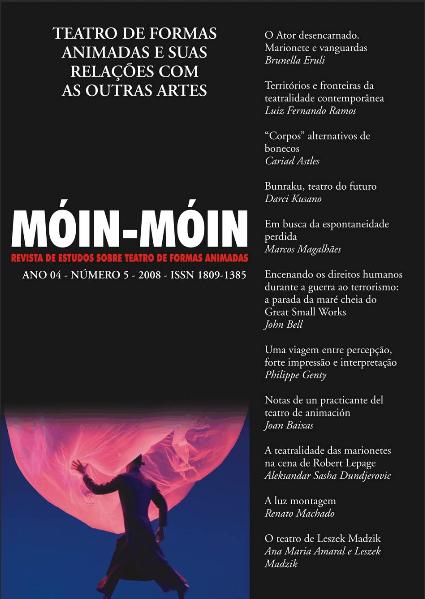Encenando os Direitos Humanos durante a guerra ao terrorismo: a parada da Maré Cheia do Great Small Works
DOI:
https://doi.org/10.5965/2595034701052008104Abstract
Na primavera de 2006, o Great Small Works foi contratado pelo
Lower Manhattan Cultural Council [Conselho Cultural de Lower
Manhattan2] para realizar uma parada artística para dar início ao
River to River Festival [Festival Rio a Rio], uma série de concertos
e performances no decorrer do verão que tinha como objetivo, me
parece, trazer de volta um certo sentimento de cultura pública viva
para a ainda traumatizada redondeza do “Ground Zero”3 de 2001.
Enquanto em anos anteriores as paradas haviam sido coleções de
esculturas de procissão de artistas novaiorquinos, nós decidimos
fazer da nossa parada River to River um evento teatral de rua, uma
reflexão política sobre o tema dos rios, as ruas e as dinâmicas de
poder em comunidades que se confrontam com transformações e
mudanças. Nisto, obviamente, estávamos seguindo tipos de tradição
já perseguidas nos anos setenta por grupos como Bread and Puppet
Theater, Welfare State International e outros, assim como as ricas
tradições de procissão dos anos 20 e 30, séculos de carnaval de rua
ultrajante, espetáculos de rua da Renascença e até mesmo as origens da tragédia grega em barcos de procissão sobre rodas – os carre navalis – que alguns consideram as raízes do carnaval europeu.
Downloads
Downloads
Published
How to Cite
Issue
Section
License
The readers are free to transfer, print and use the articles published in the Magazine, as long as there’s explicit mention to the author(s) and to Móin-Móin Magazine - Studies in Theater of Animated Forms and there are no changes on the original work. Any other use of the texts needs to be approved by the author(s) and the Magazine. In submitting an article to Móin-Móin Magazine - Studies in Theater of Animated Forms and have it approved, the author(s) agree to give away, without payments, the following rights to the Magazine: first publishing rights and the license for the Magazine to redistribute this article and its metadata to index and reference services that the editors consider appropriate.
The articles whose author(s) are identified represent the author’s point of view and not the official position of Móin-Móin Magazine. The author(s) commit to always mention the publication in the following way when publishing work in reference to the article published in Móin-Móin Magazine:
“This article was originally published by Móin-Móin Magazine volume (insert the volume), number (insert the number), in the year of (insert year) and can be accessed on: http://www.revistas.udesc.br/index.php/móin"
Plagiarism in any way constitutes an unethical publishing behavior and is unacceptable. Móin-Móin Magazine holds the right to use software or other plagiarism tracking methods to scan the submitted works.
![]()
This journal uses Attribution-NonCommercial 4.0 International– (CC BY NC 4.0).






